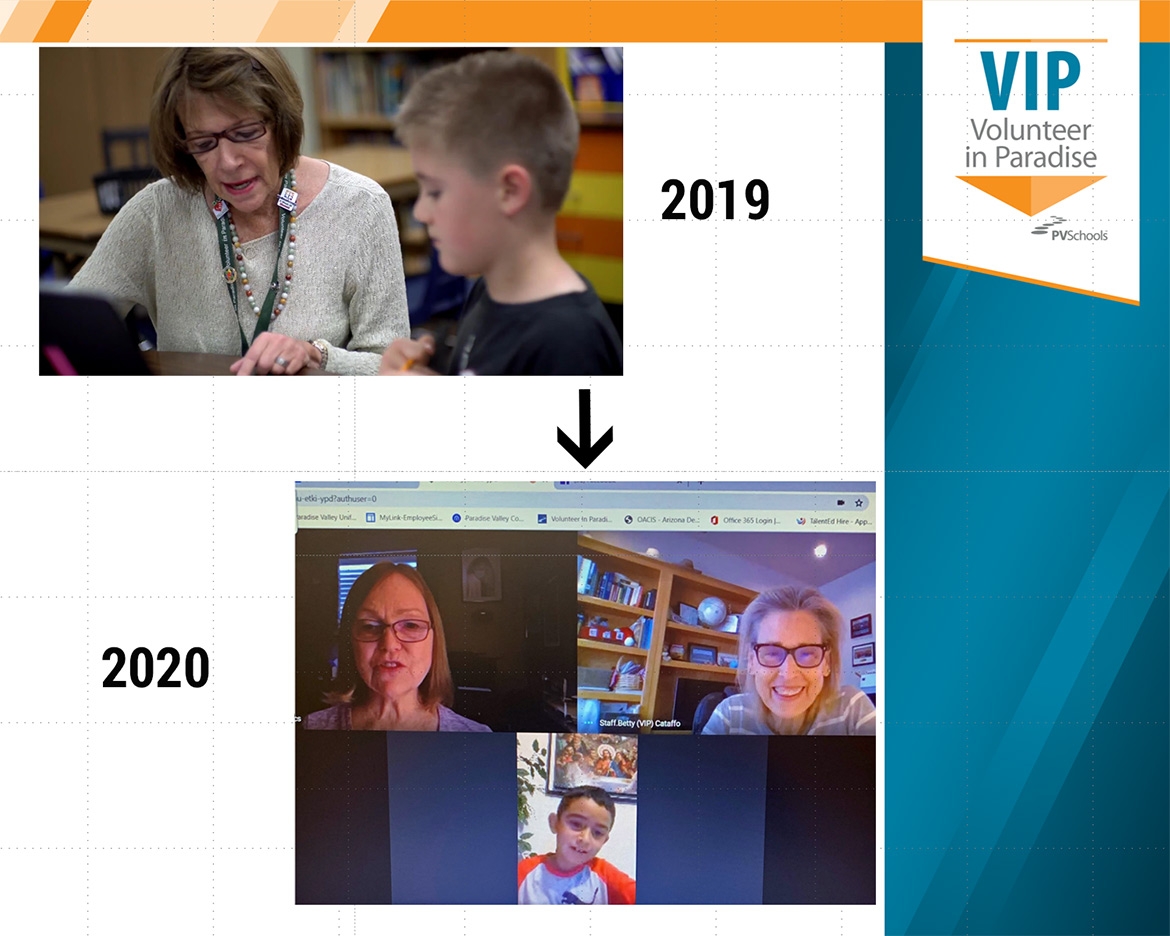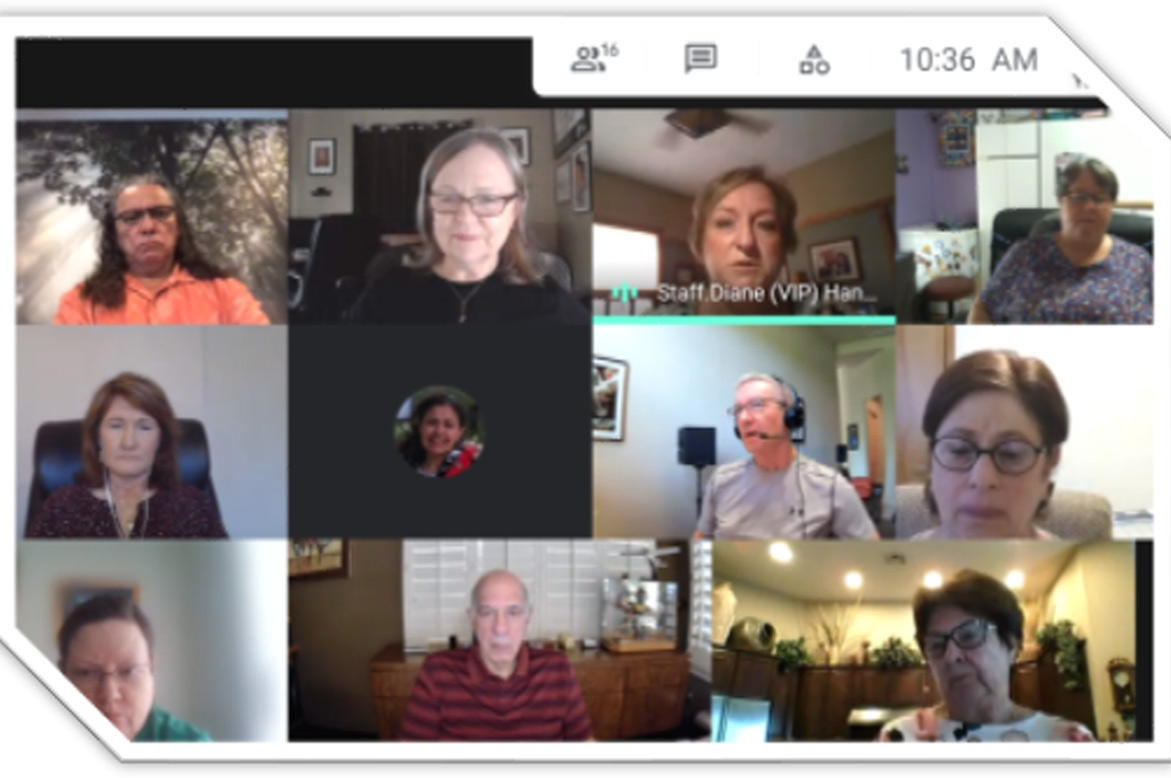
Ready to grow its impact, Volunteer in Paradise turned to the Service Enterprise Initiative

Volunteer in Paradise launched online tutoring services in 2020. Leadership and volunteers were helped with the transition by their training in the Service Enterprise Initiative through the ASU Lodestar Center. VIP completed the program in November 2020.
How Service Enterprise training helped change a school district's views on the value of a volunteer
by Alexandra Conforti, ASU Lodestar Center for Philanthropy and Nonprofit Innovation
January 27, 2021
Volunteer in Paradise, a program through the Paradise Valley (AZ) School District, has a core group of about 100 volunteers from various backgrounds, including parents, retired educators, nurses and other skills-based volunteers. Together, they provide one-on-one and small-group instruction in reading and math to nearly 1,000 students from kindergarten to 8th grade. But with an estimated 3,000 students in need of the services, VIP needed to grow.
Marisha Geraghty, volunteer coordinator for VIP, said they “were at a point where we really felt it was necessary to expand the impact we were having on our students,” and strategic and tactical ideas were necessary to move forward.
In early 2020, VIP enrolled in the Service Enterprise Initiative (SEI) through the ASU Lodestar Center for Philanthropy and Nonprofit Innovation, which works with Points of Light and the Arizona Governor's Office of Youth, Faith & Family to offer this exclusive volunteer-management program to Arizona nonprofit and public organizations. VIP is the first school district to go through the Service Enterprise Initiative program with ASU.
SEI provides organizations with access to a research-based program that includes a diagnostic evaluation of their current volunteer engagement practices and tailored recommendations for improvement, 16 hours of training focused on change-management and volunteer engagement strategies, and individualized coaching, all working towards national certification as a Service Enterprise.
Once the pandemic hit, the ASU Lodestar Center and its trainers re-invented SEI as a virtual program. VIP had started the program in February, and the training and coaching concluded in November.
Geraghty said that the initial Service Enterprise Diagnostic Survey assisted in engaging their stakeholders to speak out about the progress that Paradise Valley had made so far, and what characteristics to continue building upon to meet their goals. The district chose to focus on “tracking and evaluation” and “resource allocation” as some of its standards to work on improving.
In July, the district formed their VIP Guiding Coalition, “which was very impactful to us … which brought together many people within the Paradise Valley School District and they became our champions, our advisors through this process,” Geraghty said. She added that through the Service Enterprise Initiative process, the entire district came together for the program. The best part she says, was how it integrated the volunteers and their ideas into the district's mission. Over the summer during SEI training, the district also launched a virtual tutoring program for a select group of students, which required re-training tutors.

The district is now moving toward their Service Enterprise certification, which is expected to be completed in mid-February of 2021. Geraghty said, “The process has been illuminating because it shows that with some small changes, our organization can be a lot more effective."
“Our whole crux of establishing a vision really expanded our thinking about what we could accomplish as an organization,” Geraghty said. “Every time I said I’m giving up, the coaches were right there with us saying ‘No, you can do this’ or ‘Have you thought about this?’ and it really expanded my thinking and gave me hope as a volunteer administrator. It was life-changing -- a real ‘ah-ha’ moment.”
Through SEI, the district was able to establish a goal to assist all students in kindergarten through 8th grade who are minimally or partially proficient. Additionally, they were able to track and measure their volunteer value and leverage the skills of high-quality volunteers in new ways. “We went from an organization where all the volunteers were tutors to now, where we still have tutors but they have taken on leadership roles. That has been amazing.”
Cathy McKeever, a volunteer for VIP, said she has enjoyed tutoring both reading and writing for Paradise Valley students for the past three school years and values the volunteer experience. McKeever said that she, Geraghty and other VIPs were able to share the SEI workload and advance through the training together by combining their technical skills, business knowledge and volunteer backgrounds.
“There were a few ‘ah-ha’ moments” that stood out from the program, McKeever said. “We have a lot of volunteers with strong skill sets and we were able to incorporate everybody's strengths into this initiative process … being able to gather measurements and organization techniques was important.”
She followed by saying that the training within the initiative was “beginning to change the district’s and its administration's views on the value of a volunteer.”
The district’s initiative and willingness to focus on the change-management process of the program to help benefit their volunteer program, especially through COVID-19, was noticed by Jill Watts, who oversees the SEI program as the director of capacity building initiatives at the ASU Lodestar Center.
“What VIP has done serves as a model to other school districts that are looking to make some innovation changes around how they use volunteers to increase student interaction and engagement,” Watts said.
Watts said the SEI program is customizable to each organization's needs, such as how to better utilize skills-based volunteers, how to integrate new technology and how to introduce new policies and protocols into their existing systems. The program works strategically to move each participating organization along the path to becoming a Service Enterprise.
“What’s really unique about this program is that it focuses on the core of how your organization wants to change and what are the steps to walk you through all of those changes,” Watts said. “It meets the organizations where they’re at, and the program is really adaptable to supporting organizations no matter what size they are or phase they are at in their development.”
Learn more about the Service Enterprise Initiative and how it can elevate your organization.

